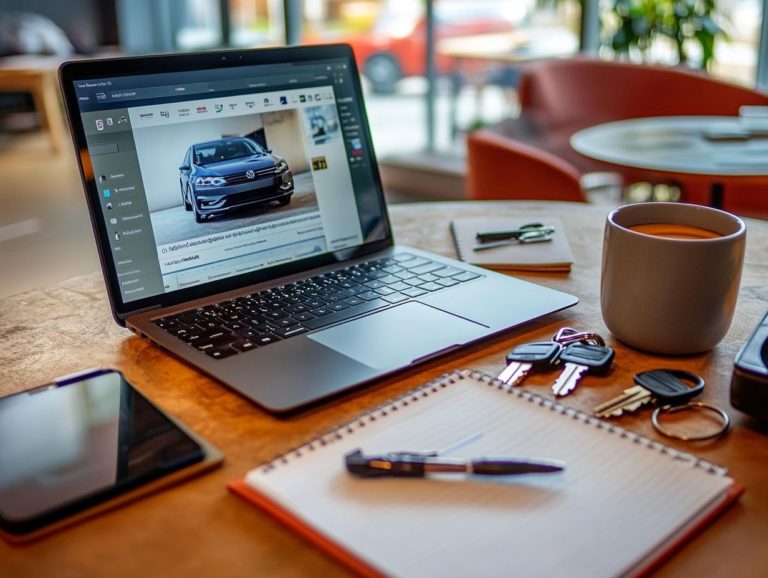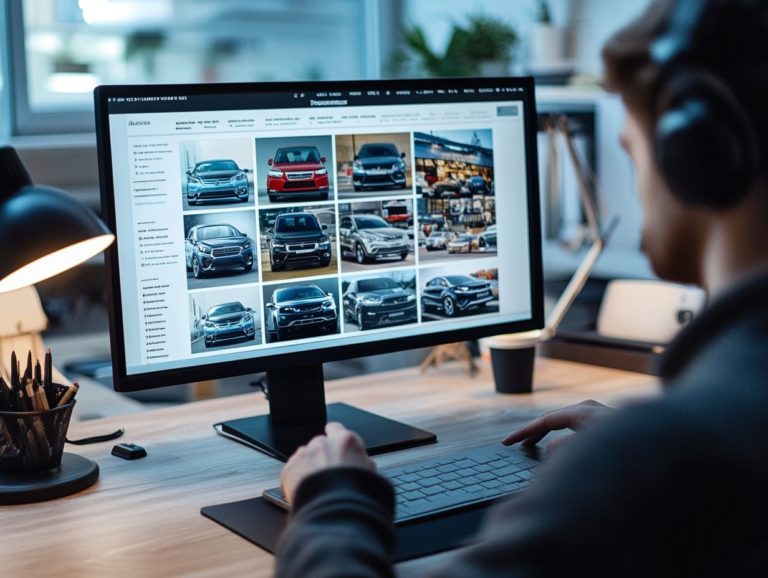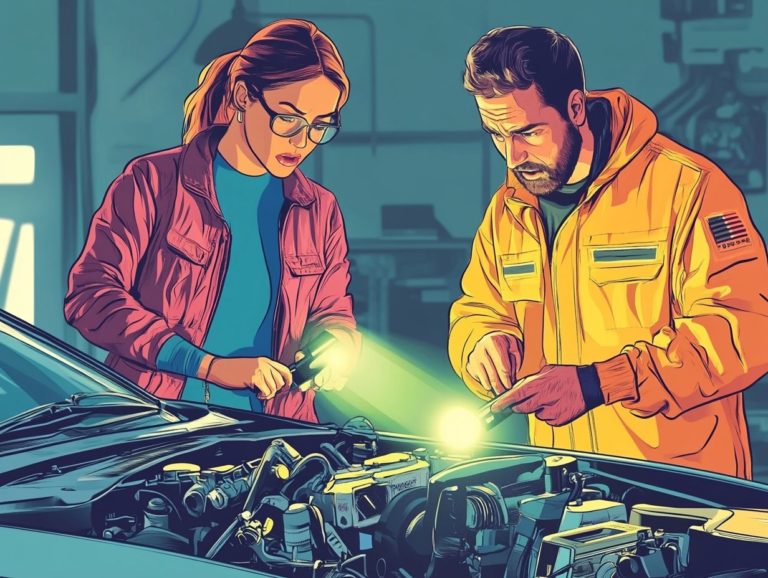How to Choose the Right Used Car
Buying a used car can be a savvy financial move, offering significant cost savings and a host of advantages that new car buyers often overlook. Whether you re a first-time buyer or looking to upgrade, it s essential to grasp the key factors at play.
From assessing your budget and specific needs to evaluating the reliability and vehicle history, this guide will help you take charge of your car-buying journey! You ll also discover where to find quality options and the crucial steps to take before finalizing your purchase.
Get ready to make an amazing choice that perfectly aligns with your lifestyle and budget!
Contents
- Key Takeaways:
- Benefits of Buying a Used Car
- Factors to Consider When Choosing a Used Car
- Where to Find Quality Used Cars
- Steps to Take Before Making a Purchase
- Frequently Asked Questions
- What should I consider when choosing a used car?
- Is it better to buy from a dealership or a private seller?
- How can I determine the condition of a used car?
- What factors can affect the value of a used car?
- Are there any red flags to look out for when buying a used car?
- What are some tips for negotiating the price of a used car?
Key Takeaways:

- Consider your budget and needs when choosing a used car to avoid overspending.
- Research and inspect the vehicle’s history (which shows a car s past, including accidents and service history) to ensure reliability and avoid unexpected maintenance costs.
- Explore options like dealerships and online marketplaces to find quality used cars at reasonable prices.
Benefits of Buying a Used Car
Purchasing a used car presents a wealth of advantages, particularly in today’s dynamic used car market, where the potential for substantial cost savings is undeniable. To make the most of your investment, it’s crucial to understand how to navigate financing a used car purchase. With sticker prices that are typically lower than their new counterparts, you’ll find a more affordable option without compromising on reliability.
Many certified used cars come with warranties, positioning them as an astute choice for discerning buyers who prioritize both quality and peace of mind. Resources like Consumer Reports offer invaluable ratings that enable you to make informed decisions, ensuring you secure the best value for your investment.
Cost Savings and Other Advantages
One of the most compelling reasons to consider purchasing a used car is the significant cost savings you can enjoy, thanks to the considerably lower sticker price compared to new vehicles.
Beyond the initial price reduction, opting for a used vehicle allows you to sidestep the steep depreciation that typically strikes during the first few years of a car’s life, sparing you from the substantial financial losses that often burden new car owners.
You’ll also likely benefit from lower insurance rates on used models, leading to additional savings over time. Plus, financing options for used cars can be more appealing, as lenders often extend better rates on older vehicles.
Consumer reports ratings provide invaluable insights into the reliability of many used models, confirming that choosing a pre-owned car can yield both economic and practical advantages without compromising on quality.
Factors to Consider When Choosing a Used Car
When selecting a used car, it’s essential for you to evaluate several key factors, including what to check before buying a used car, to ensure that your investment meets your needs and expectations.
Understanding your budget and pinpointing the specific features you desire is crucial; this knowledge lays the groundwork for your search. Moreover, assessing reliability through resources like vehicle history reports can offer valuable insights into past performance and safety ratings, helping you make a truly informed purchase decision.
Budget and Needs
Determining your budget and understanding your specific needs are essential steps when it comes to researching a used car model.
It’s important to look beyond just the initial purchase price. You should also consider ongoing expenses such as insurance, taxes, and regular maintenance costs. Taking this comprehensive approach allows you to manage your finances effectively over time.
Identifying key features that align with your lifestyle is just as crucial. Evaluate aspects like fuel economy, vehicle size, and the type of car that best suits your daily routines.
By harmonizing your financial planning with personal requirements, you can make informed decisions that significantly enhance your driving experience.
Start your search today and find the perfect used car that fits your life and budget!
Reliability and Maintenance Costs

Reliability is a crucial factor when considering used cars. To ensure you choose wisely, it’s important to know what to look for in a used car test drive. Some models are known for their dependability and lower maintenance costs.
To effectively research this aspect, immerse yourself in various consumer feedback platforms and expert reviews available online. These resources often reveal common issues faced by specific models, providing valuable insights to guide your purchasing decisions.
It s wise to seek out certified used cars, which often come with extensive warranties. These warranties act as a safety net, significantly reducing unexpected repair expenses and ensuring peace of mind while adding substantial value to your investment.
Vehicle History and Inspection
A thorough vehicle history report and inspection before making a purchase are essential for ensuring the quality and safety of a used car.
These processes not only show the vehicle’s past but also protect you from expensive problems. By running the Vehicle Identification Number (VIN) a unique code for each car through specialized databases, you can uncover crucial information, such as previous accidents, title issues, and mileage discrepancies.
Spotting these red flags is vital. Involving a qualified mechanic for a comprehensive inspection provides an expert perspective, assessing the vehicle s current condition and identifying any hidden problems.
Together, these steps offer invaluable peace of mind, enabling you to make informed decisions about your investment.
Where to Find Quality Used Cars
Finding quality used cars involves a nuanced understanding of the different avenues at your disposal. This includes exploring both dealerships and private sellers, as well as using online reviews for used cars to inform your decisions.
Dealerships vs. Private Sellers
When weighing options between dealerships and private sellers, each path offers unique advantages and challenges for car buyers.
Dealerships typically provide certified used cars backed by verifiable histories and warranties, offering a level of peace of mind often elusive when buying from individuals. Private sellers may offer lower prices but can also introduce uncertainties about the vehicle s condition and potential hidden issues.
For those prioritizing reliability, investing a bit more in a dealership vehicle could be a wise choice. No matter where you decide to make your purchase, mastering the art of negotiation is essential.
Conduct thorough research on market values, be prepared to walk away if the deal isn t right, and maintain a friendly attitude to enhance your chances of securing a fair deal.
Both avenues have their pros and cons; let’s explore how online marketplaces fit into your search.
Online Marketplaces
Online marketplaces have revolutionized access to the used car market, creating a dynamic platform for both dealerships and private sellers.
Sites like Craigslist, CarGurus, and AutoTrader present an extensive array of vehicles, tailored to fit diverse budgets and preferences. You can easily compare prices, review vehicle history reports, and negotiate directly with sellers all from the comfort of your home.
While online shopping is easy, be alert for risks! These might include scams, misleading listings, and unforeseen vehicle conditions. In today’s used car market, fluctuating demand and supply chain disruptions have driven prices up and availability down. These factors can greatly influence your decision-making process, making thorough research and a cautious approach essential as you navigate these online avenues.
Steps to Take Before Making a Purchase

Before making a purchase, it’s crucial to follow specific steps that will help you make a well-informed decision about your used car. For instance, knowing how to find the best warranty for used cars can save you from potential regrets down the road.
Ready to find your perfect used car? Start your search today!
Research and Test Drive
Researching and test driving a car are essential steps in evaluating a used vehicle. Additionally, knowing how to find reliable used car sellers can help you gather information on various models using effective research methods.
Online reviews and ratings from previous owners provide invaluable insights into the reliability and performance of each vehicle. Automotive websites and forums further enhance your understanding of common issues and standout features.
While research offers a solid foundation, nothing beats the experience of a test drive. This hands-on approach lets you assess the car’s condition, comfort, and overall performance, ensuring you make an informed decision.
Negotiating and Closing the Deal
Negotiating is an important time in the used car buying process where preparation is essential. Spend time researching current market rates and actual sale prices for similar vehicles to strengthen your negotiation.
Gather insights into the car s condition, including any necessary repairs or features that enhance its value. Double-check all documentation, especially the vehicle identification number (VIN), to ensure accuracy.
Being thorough in negotiation and document verification can lead to a better price and offer peace of mind with your purchase. Don’t miss out on a great deal! Act fast!
Frequently Asked Questions
What should I consider when choosing a used car?
When choosing a used car, consider your budget and needs. It’s also important to prepare for buying a used car by researching the make and model to ensure it has a good track record.
Is it better to buy from a dealership or a private seller?

Both options have their pros and cons. Dealerships often provide warranties, while private sellers might offer lower prices.
How can I determine the condition of a used car?
To assess a used car’s condition, have a mechanic inspect it, request a vehicle history report, and take it for a test drive. These steps help you understand the car’s overall condition and potential issues.
What factors can affect the value of a used car?
The age, mileage, condition, and popularity of a used car all affect its value. Factors like location, season, and market trends can also impact the price.
Are there any red flags to look out for when buying a used car?
Yes, watch for a lack of maintenance records, multiple previous owners, significant damage, and unusually low prices. Always inspect a used car before buying.
What are some tips for negotiating the price of a used car?
Research is crucial; know the market value of the vehicle. Use any issues as bargaining points and be prepared to walk away if necessary.
Ready to find your perfect used car? Start your car buying journey now!






